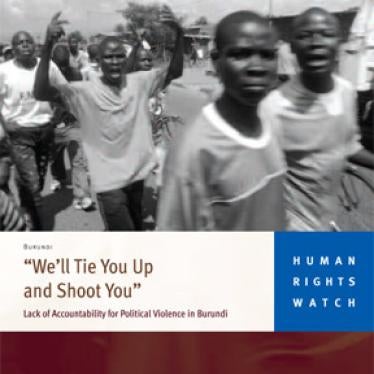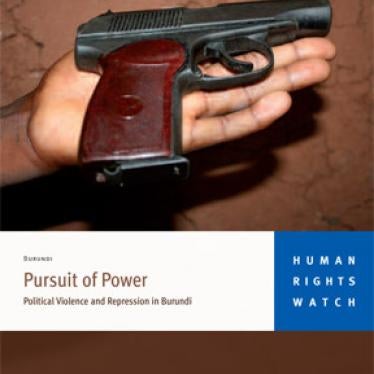(Bujumbura) - Burundian police and administrative officials must take stronger measures to prevent and punish pre-election violence, Human Rights Watch said today. Members of various political parties, especially their affiliated youth movements, have clashed on a number of occasions since November 2009. In most cases, police have not conducted thorough investigations and no one has been held accountable.
The most recent episode, on April 10, 2010, involved violent clashes between members of the opposition party National Liberation Forces (Forces nationales de libération, FNL), and members of the ruling party, National Council for the Defense of Democracy-Forces for the Defense of Democracy (CNDD-FDD) in the Kinama neighborhood of Bujumbura. Ruling party members also attacked journalists covering the clashes. The police illegally detained several FNL members afterward.
"Violence between partisan youth groups does not bode well for the upcoming elections," said Georgette Gagnon, Africa director at Human Rights Watch. "Some Burundian officials have minimized these incidents as minor problems involving wayward youth. But when grenades are thrown, journalists are attacked, and the police stand and watch, this should serve as a wake-up call to the authorities."
The incident in Kinama follows a series of confrontations between members of various parties, including the FNL-Iragi rya Gahutu (known as FNL-Iragi), an FNL splinter group affiliated with the ruling party, and Front for Democracy in Burundi (FRODEBU), in addition to the ruling party and FNL. The clashes have taken place in Kirundo, Makamba, and Cibitoke provinces as well as the capital, Bujumbura. Some incidents have resulted in serious injuries. The police should conduct thorough and impartial investigations of these incidents, Human Rights Watch said, and the authorities should hold the perpetrators accountable.
The violence has occurred in the context of the lead-up to local, presidential, and legislative elections, scheduled between May 21 and September 7. Fierce competition between the ruling party and at least four or five strong opposition parties has resulted in high levels of tension between party militants. Many parties have focused their recruitment efforts on ex-combatant youth, who can often be persuaded to carry out acts of violence.
During the Kinama incident, a grenade exploded near an FNL office. According to multiple witnesses interviewed by Human Rights Watch in Kinama, FNL members captured and seriously beat the alleged perpetrator, a CNDD-FDD member, striking him on the head with a machete. Members of the ruling party, in turn, beat several FNL members. Police and administrative officials stood by as ruling party members chased journalists who had arrived to report on the incident and shattered the window of their vehicle.
One week earlier, on April 3, FNL members had attacked FNL-Iragi militants, also in Kinama commune. Additionally, on March 31, CNDD-FDD and FNL members fought in Kirundo province, and on March 19, CNDD-FDD and Frodebu members fought in Makamba province. A similar wave of violence took place in January, when CNDD-FDD members attacked FNL members in Kirundo, and members of both parties' youth movements threw stones at each other in Kinama. Police have failed to establish responsibility for injuries produced during these incidents.
In most cases, police have carried out no investigations to identify individual perpetrators, although they sometimes intervened to put an end to the violence. A number of those from opposition parties who were injured told Human Rights Watch that they did not file complaints because they believe the police are partial to the ruling party. Under Burundian and international law, police have an obligation to investigate acts of criminality whether or not a complaint is filed.
Witnesses and victims in Kinama said that violence was fueled by police inaction and partisanship and by a failure on the part of political party leaders to take an unequivocal stance against violence.
"The increasing violence by partisan youth movements is tolerated and sometimes openly encouraged by party leaders," Gagnon said. "The government should send out a clear message that violence by activists from any party, including the ruling party, will not be tolerated. And political party leaders need to transmit this message to their members."
Background
Kinama violence on April 10
The April 10 violence immediately followed a visit by the FNL president, Agathon Rwasa, to the commune, where he conducted opening ceremonies for several local party offices. The fighting, in the Carama neighborhood of Kinama, may have been triggered when a local official confiscated whistles from FNL members. One official told Human Rights Watch that FNL members "resisted" and blows were exchanged, resulting in a minor injury to a ruling party member. The fighting took place even though numerous police and administrative officials were present.
Shortly thereafter, a grenade exploded not far from the FNL office. Journalists and FNL members who were present said that FNL members spotted a ruling party youth league member, Jimmy Ndavyemeye, armed with a grenade. They said the FNL members chased him and the grenade exploded, injuring his hand. But Ndavyemeye claimed he did not have a grenade and that he believed it was thrown by an FNL member. After the grenade exploded, FNL members assaulted Ndavyemeye. He said one person struck him on the head with a machete, while another hit him in the eye with a wooden plank, causing him to lose consciousness.
More police, led by commissioner Hassan Hagabimana, arrived on the scene and rounded up FNL members, accusing them of throwing the grenade as well as beating Ndavyemeye. Some CNDD-FDD members also participated in the arrests, beating FNL members and shoving them into police trucks. None of these ruling party members were arrested.
Human Rights Watch interviewed Ndavyemeye and four FNL members who alleged they had been beaten; all five had visible injuries that were consistent with their claims.
Journalists who arrived to document the arrests were confronted by an angry crowd of CNDD-FDD members in party uniform. The party members, armed with stones, some of them drunk, chased the journalists back to their vehicle and shattered its back windshield. Police and a local administrative official who observed the attack did nothing to prevent it.
Some of the FNL members arrested were detained for two days by commissioner Hagabimana at Camp Socarti, a police camp that is not a legal detention site, while others were detained in Kinama jail. All were released by April 14. Ruling party members complained that the person who allegedly struck Ndavyemeye with a machete was among those freed, while FNL members complained that Ndavyemeye, who was released from the hospital on April 11, had not been interrogated or arrested. Police have not initiated investigations into the attack on the journalists.
Lack of accountability for other violent incidents
Other violent incidents between party youth groups or other party members documented by Human Rights Watch between November and April include the following. In several cases, elected officials were involved in the violence; in nearly all cases, no one was held accountable.
- In Bwambarangwe commune, Kirundo province, FNL and CNDD-FDD members fought in both November and January. In the January incident, a teenage boy was beaten by FNL members after he attempted to pass through a barricade they had set up to stop CNDD-FDD members from marching in front of their office. Police did not arrest the perpetrators.
- In Rugombo commune, Cibitoke province, on January 7, an FNL youth member was beaten and struck on the chin with a machete by members of the CNDD-FDD youth league, Imbonerakure. Although the incident stemmed from a dispute did not seem to be political, while beating the FNL member, the Imbonerakure members were heard saying, "Let's kill these FNL dogs." Three suspects were arrested, but fled after being freed on bail. One was subsequently rearrested, but again released.
- On January 11, a member of the opposition party UPD-Zigamibanga was seriously beaten by members of the Imbonerakure in Buyenzi, Bujumbura. She declined to file a complaint after a member of her family, an Imbonerakure leader, convinced her not to. Police were informed of the assault by UN human rights observers, but did not investigate.
- In Kinama, between January 16 and 19, CNDD-FDD and FNL members threw stones at each other on at least two occasions, causing minor injuries, after the chef de quartier Carama (chief of Carama neighborhood), a local elected official and ruling party member, refused to permit FNL members to paint party logos on their office. Militants from both sides were briefly detained, but released with no charges.
- In Busoni commune, Kirundo province, on January 24, FNL members opening a local office were confronted by a group of Imbonerakure, armed with sticks, stones, and hoes, led by Jean Baptiste Nzigamasabo, a parliament member. The Imbonerakure chanted slogans such as, "We will tie you up, we will shoot you." They threw rocks at the FNL members and beat several of them with sticks. At least two required medical attention. Nzigamasabo confiscated equipment from a local journalist and held him and several FNL members hostage for several hours. Police intervened to stop the violence, but neither police nor judicial officials opened investigations to determine responsibility for the violence or hold the perpetrators, including Nzigamasabo, accountable.
- In Bugabira commune, Kirundo province, CNDD-FDD members reportedly beat FNL members, whom they accused of burning down one of their offices, on the evening of March 30. Police contacted by Human Rights Watch said they were investigating the incident; no arrests had been made as of April 14.
- In Kinama on April 3, when FNL-Iragi members passed through the Carama neighborhood on the way to a party activity, youth affiliated with the FNL beat an FNL-Iragi member, also mildly injuring the driver of the motorcycle he was on. They threw stones at a bus carrying other members, injuring the driver. No one was held accountable.
During the same period, several other attacks occurred that opposition parties have characterized as politically motivated, although the perpetrators have not been identified.
Sylvestre Niyonzima, a local representative of the opposition party UPD-Zigamibanga (known as UPD), was shot to death in Mpanda, Bubanza province, on January 10. UPD members said that Niyonzima, who had been an influential CNDD-FDD member before changing parties in 2007, had received threats from ruling party members shortly before his death. The Bubanza prosecutor's office is investigating the incident, but no suspects have been arrested.
Also on January 10, Félix Ngendabanyikwa, an activist for the opposition party Movement for Solidarity and Democracy (MSD), was injured on the arm by a grenade thrown into his house in Kigamba, Cankuzo province. Ngendabanyikwa had also formerly been a ruling party member, before joining MSD. He was attacked the day that he attended the opening of the provincial MSD office. No one was arrested for the attack.
On January 8, the FNL youth league president for Cibitoke province was attacked by unknown assailants, who struck him on the head and on the hand with a machete. He had recently had a dispute with local CNDD-FDD members. The perpetrators were not identified.








